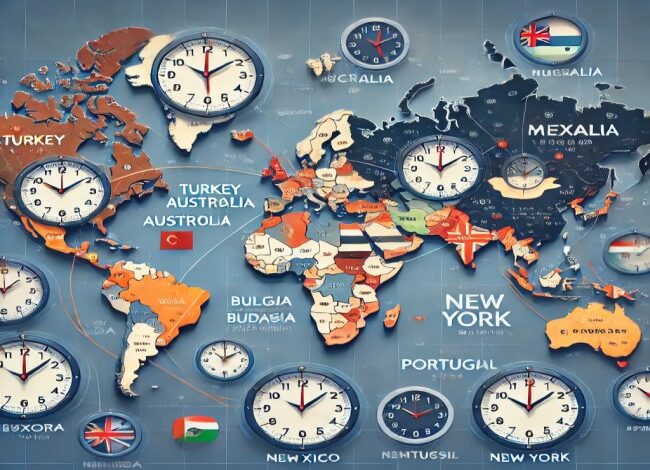Global Time Differences Explained: A Comprehensive Guide to UK Time Differences with Popular Destinations

Understanding time differences is essential for travelers, international business professionals, and anyone with family or friends across the globe. Time zones vary widely, and knowing the exact differences can make communication easier. This guide explains the time differences between the UK and several major countries, providing an in-depth look at how time varies worldwide.
Understanding Global Time Zones
Before diving into specific countries, it’s important to note how time zones operate. The UK observes Greenwich Mean Time (GMT) in the winter months and British Summer Time (BST) during Daylight Saving, shifting an hour ahead. Many other countries also use daylight saving, affecting the time difference between them and the UK.
Time Difference Between UK and Turkey
Turkey operates on Turkey Time (TRT), which is GMT +3 year-round, as Turkey does not observe daylight saving. Therefore:
- Winter: Turkey is 3 hours ahead of the UK.
- Summer: Turkey remains 2 hours ahead when the UK observes BST.
Time Difference Between UK and Australia
Australia has multiple time zones and follows Daylight Saving Time in some areas.
- Sydney and Melbourne (AEDT): GMT +11, making them 11 hours ahead in UK winter and 9 hours ahead in UK summer.
- Perth (AWST): GMT +8, meaning Perth is 8 hours ahead in UK winter and 7 hours ahead in summer.
UK Dubai Time Difference
Dubai operates on Gulf Standard Time (GST), which is GMT +4 and does not use daylight saving.
- Winter: Dubai is 4 hours ahead of the UK.
- Summer: Dubai is 3 hours ahead of the UK when BST is observed.
Bulgaria Time Difference with UK
Bulgaria follows Eastern European Time (EET), GMT +2, and observes daylight saving.
- Winter: Bulgaria is 2 hours ahead of the UK.
- Summer: Bulgaria is 3 hours ahead due to BST.
Mexico UK Time Difference
Mexico has multiple time zones:
- Mexico City (CST): GMT -6, making it 6 hours behind the UK in winter and 7 hours behind during BST.
- Tijuana (PST): GMT -8, making Tijuana 8 hours behind in winter and 9 hours behind in UK summer.
Time Difference Between India and UK
India follows Indian Standard Time (IST), which is GMT +5:30 and does not change for daylight saving.
- Winter: India is 5 hours and 30 minutes ahead.
- Summer: India is 4 hours and 30 minutes ahead when the UK observes BST.
Time Difference Between UK and New York
New York follows Eastern Standard Time (EST), GMT -5 during winter and GMT -4 during daylight saving (EDT).
- Winter: New York is 5 hours behind the UK.
- Summer: New York is 4 hours behind when BST is observed in the UK.
Time Difference Between UK and Portugal
Portugal aligns closely with the UK as it follows Western European Time (WET), which is GMT +0 and shifts with daylight saving.
- Winter: Portugal is in the same time zone as the UK.
- Summer: Portugal remains in sync with the UK during BST.
Time Difference Between UK and Spain
Spain predominantly follows Central European Time (CET), GMT +1, with daylight saving.
- Winter: Spain is 1 hour ahead of the UK.
- Summer: Spain moves to 2 hours ahead of the UK when BST is observed.
Factors Affecting Time Differences
Global time differences are not just affected by geography but also by the unique daylight saving practices each country follows. For instance, while most of Europe observes daylight saving, several countries in Asia and the Middle East, like India and the UAE, do not. This results in seasonal shifts in the time difference between the UK and these countries.
The Impact of Time Zones on Communication and Travel
Knowing time differences can help streamline communication and avoid disruptions when scheduling international calls or meetings. For travelers, being aware of the time difference is also beneficial in planning flights, avoiding jet lag, and ensuring they’re prepared for the local time upon arrival.
Conclusion
Understanding the time difference between the UK and other parts of the world is crucial for smooth interactions across borders. By being informed of these time shifts, you can better manage personal connections, professional commitments, and travel plans, no matter where you are or where you’re connecting.



